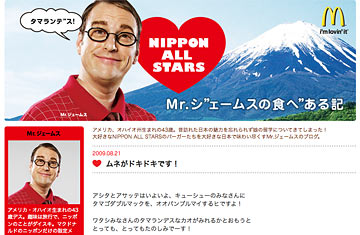
A Japanese ad for McDonald's with the controversial character Mr. James
Mr. James is lovin' being back in Japan. The exuberantly geeky American mascot of McDonald's Japan's latest ad campaign oohs and aahs over fireworks. His smile beams from his cardboard cutouts outside McDonald's establishments across the country.
But a growing number of non-Japanese who live in Japan are decidedly not lovin' Mr. James. In a country known for its small foreign-born population — only 1.5% of 127 million — and restrictive immigration and naturalization policies, the new envoy for McDonald's Japan is creating a stir among non-Japanese residents.
A doppelgänger of Steve Carell's 40-year-old virgin with glasses, Mr. James is a character invented by Japanese advertising behemoth Dentsu and McDonald's Japan for its new burger line — the "Nippon All Stars" — campaign. The purpose of the campaign, running Aug. 10 to Nov. 5, is to promote four burgers available only in Japan. On his blog, found on the McDonald's Japan website, Mr. James describes himself as a 43-year-old Japanophile born in Ohio with a penchant for travel, who, when particularly excited, generously treats people he doesn't even know. (That seems to be a plug for the $1,000 cash prizes for 1,000 people who submit photos of Mr. James or people imitating Mr. James.)
But elsewhere, Mr. James, dressed in his buttoned-up red polo shirt, tie and khakis, is seen as playing to Japan's xenophobic tendencies. Annoyed expats have described the character as "white, dorky" and speaking "mangled Japanese." The chair of the Foreign Residents and Naturalized Citizens' Association of Japan, Arudo Debito — a naturalized Japanese citizen born David Aldwinckle — has officially protested the Mr. James campaign with a letter to McDonald's Corp. headquarters in Illinois. Soon after the ads started to roll out, somebody set up an "I hate Mr. James" Facebook group, which now has 67 members.
Arudo considers the characterization of a "clumsy sycophantic 'nerd' " an embarrassment. "If this were in a different country, and we had a Japanese in a [summer kimono] and [wooden sandals] saying 'Me like Mcflied lice, please eato,' we'd have the same sort of antidefamation league speaking out and saying this is disparaging to Asians or Japanese," says Arudo. He says the campaign's portrayal of non-Japanese as "unquestioningly supportive and culturally ignorant" will only make life more difficult for foreigners in Japan.
On his blog, Mr. James posts travel plans — to places like Kyushu, where he visits McDonald's restaurants — and ruminates about his favorite burgers. He bungles his attempts at written Japanese and mispronounces words with a staccato-like butchering of the language. One online video shows him talking to himself while practicing from a phrasebook, proclaiming "horenso" (spinach) with a gesture. Mr. James has appeared in two commercials since the campaign began, in which he also mistakes words, for instance, yelling "tamago" (egg) in Japanese instead of the similar-sounding word tamaya, which is shouted during fireworks.
McDonald's Japan spokesman Junichi Kawaminami says there is no official response to criticism of the Mr. James campaign. He does, however, explain the story of the character, which appears in the first commercial. "Mr. James' daughter was determined to go to Japan and study, and so he looked at maps and got excited to go with her," says Kawaminami. "Once he found out that McDonald's was offering the Tamago Double Mac, it became the deciding factor." Why? It was on the McDonald's Japan menu years ago and became Mr. James' favorite when he was a student in Japan. That, says Kawaminami, is when Mr. James became a great fan of Japanese culture and food.
Some of the Mr. James criticism, however, seems a little thin. One comment on Facebook says that because Mr. James wears the same clothes every day in August, it might suggest that foreigners are "unclean." If we're going to look at the clothing choices of fast-food icons, it seems fair to point out that Ronald McDonald and Colonel Sanders have been wearing their famous uniforms for half a century. There's no doubt that the spectacle of the foreigner in Japan is an everyday occurrence in media. A foreigner's response that he or she can use chopsticks or enjoys raw fish is met with smiles and amazement because — in some ways — affirmation of Japanese culture is stronger when it comes from outside, or is a non-Japanese perspective. But there is certainly no shortage of elegant, articulate Japanese-speaking foreigners in local media, from morning television programs to magazine advertisements for Japanese products.
The "cute and unthreatening" American who eagerly returns to Japan with his daughter and is driven by a hunger to eat the same burger he ate in his youth — basically a double Big Mac with an egg on it — is as much an affirmation of Japanese food by McDonald's Japan as it is unbelievable and unrealistic as a narrative. That's why it's a commercial campaign. To protest Mr. James as a stereotype of a minority population in Japan because the Ohio native fails to speak or write Japanese fluently, dresses like a nerd and blogs about burgers only ends up underscoring the fact that there really aren't a lot of foreigners who fit the bill running around Japan. For most foreigners in Japan who know no one like that — and who only see a burger mascot — it begs the question: Where's the beef?
